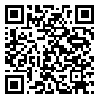دوره 23، شماره 3 - ( 7-1404 )
جلد 23 شماره 3 صفحات 286-277 |
برگشت به فهرست نسخه ها
Download citation:
BibTeX | RIS | EndNote | Medlars | ProCite | Reference Manager | RefWorks
Send citation to:



BibTeX | RIS | EndNote | Medlars | ProCite | Reference Manager | RefWorks
Send citation to:
Pourmohamadreza-Tajrishi M, Mirzaee R, Ghobari Bonab B. The Efficacy of Cognitive-behavioral Play Therapy on Internalizing Behavior Problems. Iranian Rehabilitation Journal 2025; 23 (3) :277-286
URL: http://irj.uswr.ac.ir/article-1-2320-fa.html
URL: http://irj.uswr.ac.ir/article-1-2320-fa.html
The Efficacy of Cognitive-behavioral Play Therapy on Internalizing Behavior Problems. مجله انگلیسی زبان توانبخشی. 1404; 23 (3) :277-286
چکیده: (2697 مشاهده)
Objectives: Numerous studies have documented the effectiveness of play therapy in helping children modify their thoughts and behaviors. This study aimed to determine the efficacy of cognitive-behavioral play therapy (CBPT) in addressing internalizing problems in children aged 8–10 years.
Methods: This quasi-experimental study employed a pre-test and post-test design with a control group, involving 391 students selected through cluster sampling. Students were assessed using the child behavioral checklist (CBCL), multidimensional anxiety scale (MASC), and child depression inventory (CDI). Among 153 students whose scores were T≥63 in CBCL, ≥60 in MASC and ≥18 in CDI, 42 individuals diagnosed as having internalizing disorders through the psychiatric interview and assigned randomly and equally to the experimental and control groups. The experimental group attended 14 therapeutic sessions (once a week, 45 minutes each session) and received CBPT, but the control group did not. After the last session, all participants were reassessed using the CBCL, MASC, and CDI. Data were analyzed using multivariate analysis of covariance (MANCOVA).
Results: The results showed that the internalizing behavior problems of the experimental group reduced after attending CBPT sessions. According to the eta coefficient, 40%, 69%, 69%, 72%, 55%, and 62% of the variation in internalizing behavior problems and their factors (anxiety/depression, withdrawal/depression, somatic complaints [SC]), anxiety, and depression in the experimental group were due to participating in CBPT.
Discussion: It can be concluded that the CBPT is a useful therapeutic technique to reduce internalizing behavior problems and their negative effects on academic performance in 8–10-year-old children.
Methods: This quasi-experimental study employed a pre-test and post-test design with a control group, involving 391 students selected through cluster sampling. Students were assessed using the child behavioral checklist (CBCL), multidimensional anxiety scale (MASC), and child depression inventory (CDI). Among 153 students whose scores were T≥63 in CBCL, ≥60 in MASC and ≥18 in CDI, 42 individuals diagnosed as having internalizing disorders through the psychiatric interview and assigned randomly and equally to the experimental and control groups. The experimental group attended 14 therapeutic sessions (once a week, 45 minutes each session) and received CBPT, but the control group did not. After the last session, all participants were reassessed using the CBCL, MASC, and CDI. Data were analyzed using multivariate analysis of covariance (MANCOVA).
Results: The results showed that the internalizing behavior problems of the experimental group reduced after attending CBPT sessions. According to the eta coefficient, 40%, 69%, 69%, 72%, 55%, and 62% of the variation in internalizing behavior problems and their factors (anxiety/depression, withdrawal/depression, somatic complaints [SC]), anxiety, and depression in the experimental group were due to participating in CBPT.
Discussion: It can be concluded that the CBPT is a useful therapeutic technique to reduce internalizing behavior problems and their negative effects on academic performance in 8–10-year-old children.
نوع مقاله: پژوهشي |
موضوع مقاله:
روانشناسی
دریافت: 1403/4/26 | پذیرش: 1403/10/11 | انتشار: 1404/6/10
دریافت: 1403/4/26 | پذیرش: 1403/10/11 | انتشار: 1404/6/10





